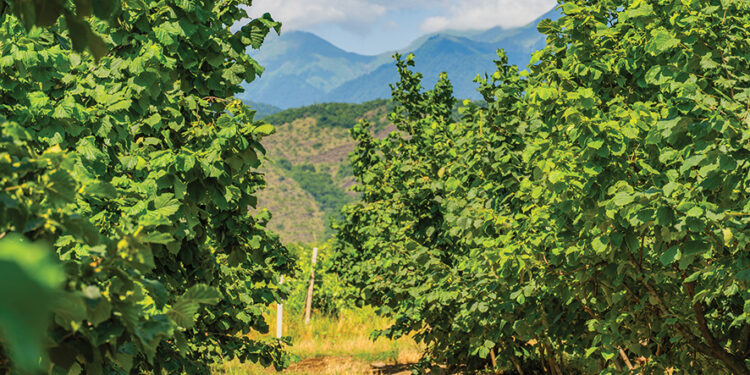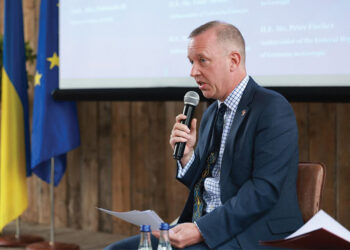Georgia’s hazelnut sector has once again benefitted from a specialized training initiative aimed at enhancing food safety across all stages of production. This recent round of knowledge-sharing sessions focused on practices before, during, and after the harvest season. Organized by the Food and Agriculture Organization of the United Nations (FAO) in collaboration with AgriGeorgia (Ferrero’s local hazelnut subsidiary), the training was supported financially by the European Union and Sweden under the ENPARD IV program.
The primary goal of the training was to strengthen the sector’s international competitiveness by promoting advanced food safety protocols throughout the hazelnut production and processing cycle. Sessions were held in two of Georgia’s key hazelnut-producing regions: Kakheti and Samegrelo-Upper Svaneti.
Participants engaged in detailed discussions on essential topics to ensure the high quality and safety of harvested hazelnuts, including:
• Efficient use of machinery in mechanical harvesting;
• Comparing mechanical and traditional manual harvesting methods;
• Best practices for post-harvest handling, including de-husking, cleaning, and drying;
• Proper techniques for safe and efficient storage;
• Strategies to prevent Aflatoxin contamination during and after harvest at the farm level.
Led by FAO International Expert Matteo Giaccone, the sessions attracted over 100 stakeholders from Georgia’s hazelnut value chain. Many of these participants will have the opportunity to join additional training events later this year, co-organized by FAO and AgriGeorgia under ENPARD IV. These upcoming sessions will further deepen knowledge on food safety and Aflatoxin prevention, particularly targeting hazelnut collectors, processors, and exporters.
“Improving food safety standards in hazelnut production directly boosts the sector’s competitiveness, both in domestic and international markets—especially in the EU,” said Guido Agostinucci, FAO Program Manager. “Together with AgriGeorgia, and with the generous support of the EU and Sweden through ENPARD IV, FAO is tackling critical aspects of food safety from orchard management to post-harvest practices. Applying this knowledge will lead to better-quality hazelnuts and greater economic benefits for Georgia.”
Denis Reiss, Program Officer for Sustainable Food Systems at the EU Delegation to Georgia, added: “The European Union applauds the efforts of FAO and the wider Georgian hazelnut value chain in offering sustainable, practical alternatives to traditional production methods. These efforts are vital to ensure safe handling and to meet international market standards. This educational initiative is a forward-looking investment in the future of Georgian agriculture and food safety.”
As a next step in this capacity-building initiative, FAO and AgriGeorgia are planning to host a Hazelnut Sector Machinery Demonstration Day (Demo Day) in July. Also supported by the EU and Sweden through ENPARD IV, this event will bring together farmers and agricultural machinery suppliers. The goal is to foster hands-on learning, promote the adoption of modern technologies, and build stronger networks—ultimately improving productivity, efficiency, and adherence to food safety standards.
About the European Union
For over 30 years, the European Union has been a committed partner in Georgia’s development, supporting progress through knowledge sharing, innovation, and financial assistance. This relationship is rooted in shared values of peace, democracy, human rights, and inclusive economic growth. Learn more: eu4georgia.eu
About ENPARD
The EU’s ENPARD (European Neighborhood Program for Agriculture and Rural Development) has supported rural development in Georgia since 2013. Originally focused on boosting agricultural capacity, ENPARD has since expanded to address rural economic opportunities and, since 2021, food safety improvements. ENPARD IV’s food safety component is implemented by FAO and the Czech Development Agency, with additional support from Sweden.
By Team GT














